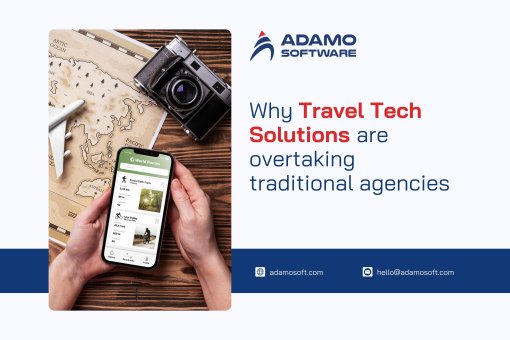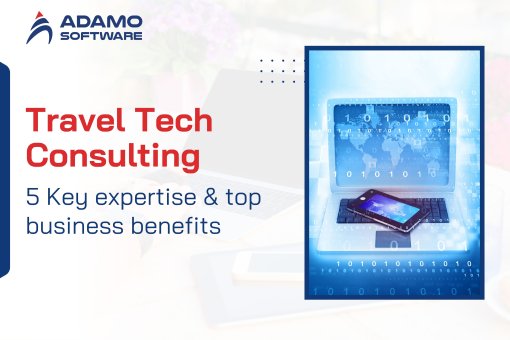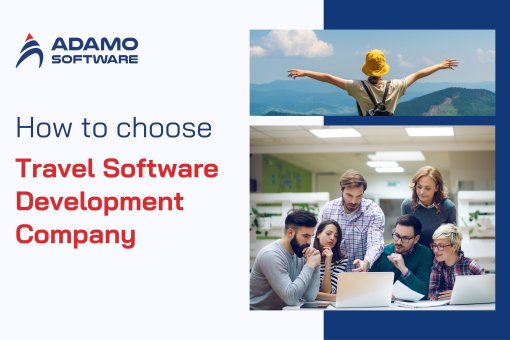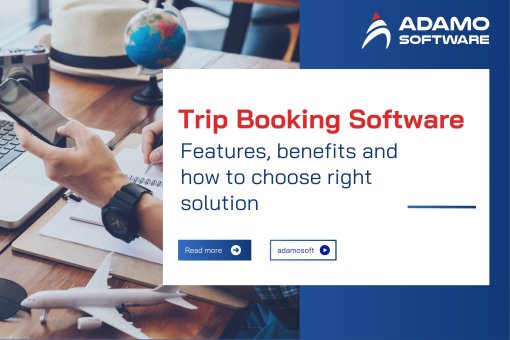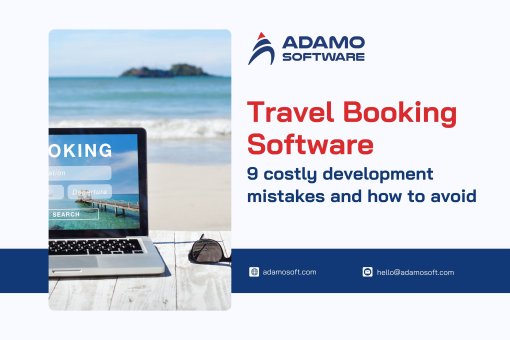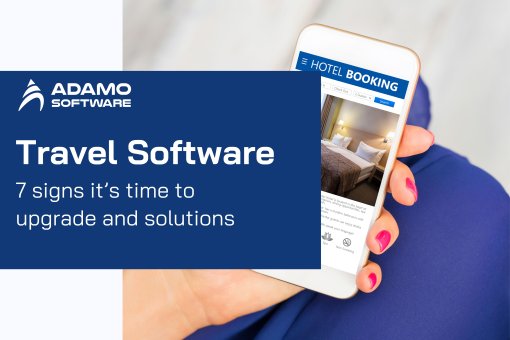12 Must-have Features of the Travel Portal Solution to Drive Traffic and Revenue

Discover 12 key features that will boost traffic and revenue for your travel portal solution. Unlock the potential of your online business and boost revenue.
The travel industry is experiencing a significant shift. With about 148.3 million online travel bookings made every year, travelers are increasingly relying on the internet to plan and book their trips. This trend presents both an opportunity and a challenge for travel agencies, as they strive to maximize their revenue and stay ahead in a highly competitive market.
One solution has emerged as crucial for the success of travel agencies: the travel portal solution. A travel portal serves as a comprehensive platform that allows travelers to explore destinations, compare prices, book flights, accommodations, and other travel services, all in one place.
But what sets apart a successful travel portal from the rest? Let’s delve into the 12 must-have features that can truly drive traffic and revenue for travel agencies. From seamless user experience to personalized recommendations, we will explore the key elements that make a travel portal solution indispensable in today’s digital age.
I. Benefits of travel portal solution for travel agencies
A travel portal solution can help travel agencies manage operation in an easy way. It retrieves data from authorized central servers and offers users the most affordable fares and optimal service, fulfilling users’ constant desire for both.
1. Personalized customer experience
With travel portal solution, agencies can provide highly personalized customer experiences, meeting the requirements of customers who seek tailored services.
2. Offer global reach
Travel agencies can compete not only with domestic rivals but also with global competitors. A Vietnamese travel agent offering tours and travel packages in any part of the country can now effectively compete with both Vietnamese competitors and travel agencies based in foreign countries. This provides opportunities for travel agencies to showcase their services and attract customers from around the world.
3. Access to travel information
Travel portal solutions integrate multiple search results into one place thanks to API integration, allowing travelers to find everything such as tour operators, accommodations, flights, service providers… that they need in a single platform.
4. More efficient booking processes:
The significant advantage of a travel portal solution is streamlining the booking process, making it faster and more efficient for both travel agents and customers. Travelers only need a phone or a laptop to book their trips and services. With this convenience, companies can improve customer satisfaction.
5. You gain business insight and management
The reporting and analytics features included in travel portal solution can allow travel agencies to gain valuable business insights and effectively manage their operations such as customer data, real-time bookings, direct payment, and more.
6. Offer 24/7 customer support
As online travel agencies typically offer 24/7 customer support through various channels, such as live chat, email, or phone, they can ensure that travelers can get assistance whenever needed.
7. Minimize operational cost
Travel agency portal solutions come with advanced sales automation features that improve efficiency, reduce costs, and integrate with existing systems, streamlining the booking process.
8. Improved brand presence
A well-designed travel portal solution can help businesses gain brand presence and boost brand awareness among customers. It is because they can increase their visibility in the online market and target millions of customers through internet,
II. 12 key features of travel portal solution
When creating a thriving travel portal solution, it is important to consider many key features and functionalities. These elements play a vital role in attracting travelers and ensuring a seamless user experience. Let’s explore some of the essential components of a travel portal:

1. Booking engine
One of the important functions of travel portals is to allow customers to book flights, hotels and other services directly on it. Besides, administrators can manage these bookings on the administrative dashboard.
2. Secure payment gateway
To help customers make online payments safely and conveniently, a travel portal solution should have a secure payment gateway integrated. This can include many payment options such as credit cards, debit cards, banking, and digital wallets.
3. Integration with API and XML
A travel portal solution should have the capability to integrate with various APIs and XML feeds, allowing travel agencies to connect with hotels, transport providers, car rental companies, and more
4. User profile management
User profile management is the primary way for customers to have personalized experience. With this feature, registered users can be able to manage their bookings and their purchase history.
5. Advanced search filter
97% of consumers consider convenience while making a purchase these days. As a result, your travel portal should offer advanced search filters to help them find their ideal travel more quickly. These filters might include price range, travel dates, accommodation options, and so on.
6. Multi-language and multi-currency support
If you want to reach global customers, multi-language and multi-currency support is a needed function. This feature offers users from different countries and regions the chance to navigate the travel portal solution and make purchases in their language and currency.
7. Mobile-friendly interface
Your travel portal should be optimized for smooth booking experiences on mobile devices. It should provide users with a responsive and easy-to-use interface to navigate and make bookings easily.
8. Intuitive user interface
Having a user-friendly and intuitive interface is crucial for the success of any travel portal. It is essential to have clear navigation, a logical layout, and easily understandable icons that collectively contribute to a seamless user experience.
9. Social media integration
Nowadays, 5.04 billion people around the world use social media and many of them want to share their travel experiences with their network. Social media integration feature can help in promoting your travel portal and attracting more new users.
10. Real-time updates
A travel portal solution should provide real-time updates on availability, prices, and other relevant information so users can have the most up-to-date information at their fingertips.
11. Customer reviews and ratings
Customers can access reviews and ratings from other travelers to make informed decisions about their bookings. That’s why you need to include the reviews and rating features in travel portals.
12. Customization options
A travel portal solution should also offer customization options to meet the specific needs of business at any type and can scale as the business grows.
III. Process to build a travel portal solution: Secrets revealed
Are you ready to discover the secrets behind building an amazing travel portal solution? Let’s walk through the step-by-step process and reveal the key elements that contribute to a successful travel portal.

1. Analyze and understand requirements
To develop a cutting-edge travel portal solution, the first step is to analyze and understand all the requirements of businesses. This stage involves collecting information about:
_ The travel portal solution type
_ Target market and audiences
_ Specific features and functions
_ The project scopes
_ Required resources
2. Create UX/UI design and user interface
On the requirements are understood clearly, the second step is to create the UX/Ui design and user interface of the travel portal solution. This phase includes:
_ Create mockups and wireframes
_ Represent the structure and layout
3. Design database
To manage and store user profiles and information, a travel portal might require a database. This data is flight details, booking records and accommodation information. The database designer will decide how the data elements correlate and what data will be stored. This phase also provides logical understanding of data flow and on-going development. Taks involved in this stage are:
_ Determine the structure of data
_ Define relationships between data entities
4. Development stage
To create a functional and user-friendly travel portal solution that meets your specific requirements and provides a seamless booking experience to customers, the development stage is the most crucial. This includes:
_ Implementing the front-end user interface
_ Integrating third-party APIs
_ Developing the back-end system
_ Customizing the portal
_ Ensuring scalability and futureproofing
5. Testing and quality assurance
Once the development phase is finished, testing and quality assurance will be conducted to determine and fix bugs and issues. This stage is to ensure the final solution can minimize risks during operating. This includes:
_ Test the portal’s functionality
_ Check the performance
_ Check the security
_ Test the compatibility with different devices and browsers
6. Deployment
After completing the testing phase, the travel portal is now prepared for deployment to the live environment. The live environment of the application has been deployed on the designated server, and the application is now in a fully functional and ready-to-use state. This process includes:
_ Establish the server infrastructure
_ Configure the required software
_ Transfer the portal’s files to the production server
7. Warranty
After the portal is launched, continuous maintenance and support are crucial to ensure its seamless operation. This involves regularly updating and improving its features to meet evolving requirements and enhance the user experience.
IV. Cost to build a travel portal solution
The cost of building a travel portal solution can vary depending on some main factors including portal types, commerce platforms and complexity and scale of the travel portals.
1. Travel portal types
The costs for two different types of business: B2C (business to customer) and B2B (business to business) can differ.
B2C travel portal
This means the cost for B2C portal development typically falls between around $3,000 to $15,000.
B2B travel portal
When it comes to developing a B2B travel portal, the cost is usually higher than that of a B2C portal. B2B travel portal development can range from around $5,000 to $20,000.
Depending on the complexity and scale of the travel portal, the overall cost of travel portal development can vary.
2. Travel commerce platforms
Flight booking
The cost of developing a basic flight reservation system with API integration for a travel portal typically falls within the range of $6,000 to $9,000. If you choose to integrate a booking engine with GDS (Global Distribution System) integration, such as Amadeus, you can expect to add approximately 25% to the overall cost.
Hotel booking
For a hotel booking engine with a basic design, the travel portal development cost usually ranges from $5,000 to $7,000. Remember that any customization in design, functionality, or additional features may incur additional costs.
Car rental booking systems
Adding a car rental software or a cruise/bus booking engine to a travel portal costs between $3,000 to $5,000 each. However, it’s important to note that the cost may vary if you opt for a single module system development.
3. Complexity of the online travel portal
Business planning and analysis
Cost: The cost for this phase can range from $1,000 to $5,000.
Design, prototype, and development
Cost: The cost for this phase can vary significantly based on the complexity and desired functionality of the platform.
Basic travel portal: A basic travel portal with essential features such as flight and hotel booking, user registration, and search functionality can cost between $10,000 and $30,000. This type of portal typically has a simple and user-friendly interface but may lack more advanced functionalities.
Intermediate travel portal: An intermediate travel portal, which includes additional features like car rental, travel insurance, and payment gateway integration, will have a higher cost range. This type of portal may also incorporate CRM capabilities and more advanced search options. The estimated cost for an intermediate travel portal can range from $30,000 to $70,000.
Advanced travel portal: An advanced travel portal with complex features and integrations, such as multi-language support, dynamic packaging, third-party API integrations, and advanced analytics, requires a higher budget. The cost range for this level of portal can vary from $70,000 to $100,000 or more.
Testing and quality assurance
Cost: The cost for this phase can range from $2,000 to $10,000.
Final deployment
Cost: The cost for this phase is typically included in the travel portal development cost but may vary depending on hosting requirements and server setup.
Besides, you can explore the travel portal development cost: estimated cost for building an online travel portal development solution with Adamo to get more details.
V. Factors to choose a travel portal development company
If you can find a travel portal solution that fits best with your requirements, you can consider hiring a company offering a travel portal development solution. Take these below factors of your partners into consideration before making decision:
1. Their expertise and experience in developing travel portal solution
First and foremost, look for a company with a proven track record in developing successful travel portals.
One convenient approach is to visit the websites of potential partners and explore their case studies, client testimonials, and project portfolios. This will provide you with valuable insights into their capabilities and previous work.
There are also trusted platforms such as Clutch, GoodFirms, and Gartner’s Peer Insights that offer detailed profiles, ratings, and reviews of travel portal development companies. These platforms rely on client feedback and industry expertise to help you make an informed decision.
Glassdoor, LinkedIn, and the social media platforms of potential partners can provide valuable information about their services and client testimonials.
2. Their customization options for travel portal solution
It is also important to ensure that the travel portal development company you choose offers customization options to cater to the unique requirements of your travel portal.
This ensures that the final solution is tailor-made to meet your specific needs and aligns with your business objectives. The company should be able to understand your vision and collaborate closely with you throughout the development process.
For example, let’s say you are looking to create a travel portal that focuses on luxury travel experiences. You have a specific design aesthetic in mind, with elegant visuals and a seamless user interface. In this case, you would want to work with a development company that not only has experience in building travel portals but also understands the luxury travel industry and can bring your vision to life.
3. Their technology stacks to build travel portal solution
Consider the technology stack used by the partner you want to choose. Ensure that they utilize advanced and reliable technologies that can support the functionality and scalability of your travel portal.
You might want a robust and scalable travel portal solution that can stand the test of time and adapt to evolving customer demands.
Let’s consider the emerging trend of artificial intelligence (AI) in the travel industry. AI-powered chatbots and virtual assistants are becoming increasingly popular for providing personalized recommendations, answering queries, and assisting with bookings. So, if you partner with a development company that is knowledgeable in AI technologies, you can integrate intelligent features like chatbots into your travel portal to enhance the customer experience.
Similarly, advancements in mobile technology have transformed the way people access travel information and make bookings. A development company that specializes in mobile app development can help you create a responsive and user-friendly mobile application for your travel portal, offering accessibility to users on the go.
4. Their support and maintenance
It is advisable to select a company that provides comprehensive support and maintenance services to ensure the smooth and efficient operation of your travel portal solution. You can have peace of mind knowing that your travel portal will receive the necessary updates and assistance to operate smoothly and efficiently.
These include:
_ Timely updates
_ Bug fixes
_ Technical support
5. Their cost to build travel portal solution
While cost should not be the sole deciding factor, it is crucial to find a company that offers the best value for your money. Let’s consider to:
_ Request detailed quotes from multiple companies
_ Compare pricing models
_ Look beyond the price tag and consider the value you will receive
_ Discuss the project timeline to align with your business requirements
VI. Create an Online Travel Portal – Transform Your Travel Agencies with Adamo
At Adamo, we understand the importance of allocating human resources promptly, ensuring timely product launches in the market, and delivering lucrative travel portal solutions. Thus, Adamo has become one of the best online travel portal development company in Vietnam. As a premier software development company in Vietnam, we prioritize transforming your business ideas into bespoke online travel portals. Our team of experienced developers specializes in building custom software solutions, with a particular focus on the travel industry. If you’re looking to bring your travel portal concept to life, don’t hesitate to contact us.






